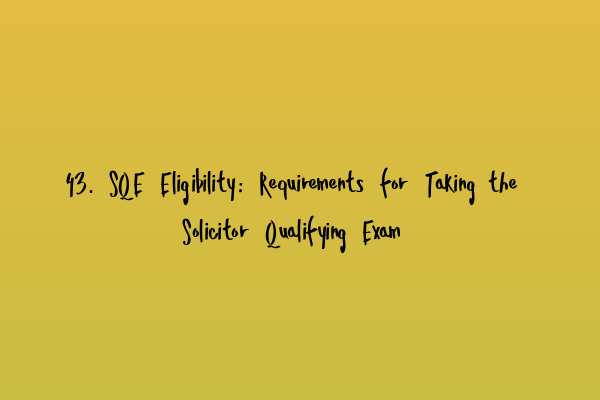43. SQE Eligibility: Requirements for Taking the Solicitor Qualifying Exam
Are you dreaming of becoming a solicitor in England and Wales? The Solicitors Qualifying Exam (SQE) is the new route to qualification that replaces the traditional training contracts and LPC pathway. Before you embark on this journey, it’s essential to understand the eligibility requirements for taking the SQE. In this article, we will break down the crucial criteria you need to meet, ensuring you’re on the right path to becoming a qualified solicitor.
1. Academic Qualifications
The first eligibility requirement for the SQE is to hold an undergraduate degree or an equivalent qualification. This degree can be in any subject, as there are no specific academic requirements related to the study of law. Whether you have a degree in history, biology, or even music, you can still pursue a career in law through the SQE route.
2. Character and Suitability Assessment
Aspiring solicitors are also required to pass the character and suitability assessment set by the Solicitors Regulation Authority (SRA). This assessment aims to ensure that individuals entering the legal profession have the necessary attributes to undertake the role of a solicitor ethically and responsibly.
The character and suitability assessment involves disclosing any previous or ongoing criminal convictions, financial difficulties, or any other factors that may impact your suitability to practice as a solicitor. Honesty and transparency are essential in this assessment, as the SRA reserves the right to refuse qualification if there are concerns regarding an applicant’s character or suitability.
3. English Language Proficiency
Proficiency in the English language is a vital requirement for practicing law in England and Wales. If English is not your first language, you will need to provide evidence of your language skills. The required level of proficiency will depend on the guidelines set by the SRA. It is crucial to check the SRA’s latest requirements and ensure that you meet the necessary standards.
4. Exemption from SQE1
If you already hold an LPC (Legal Practice Course) or a GDL (Graduate Diploma in Law) from a recognized university, you might be eligible for an exemption from SQE1, the first stage of the SQE examination. Exemptions are granted on a case-by-case basis, so it is advisable to contact the SRA to determine your eligibility.
5. Completion of Qualifying Work Experience (QWE)
Alongside passing both stages of the SQE, aspiring solicitors must complete a period of Qualifying Work Experience (QWE). The QWE is a vital component of the qualification pathway, enabling candidates to develop the practical skills and competencies required to practice as a solicitor.
The SRA has specific criteria and guidelines for the QWE, ensuring that candidates gain experience across different legal practice areas and acquire a well-rounded understanding of the profession. It is advisable to familiarize yourself with the SRA’s requirements early on in your legal journey to plan and secure suitable work experience opportunities.
Conclusion
The SQE offers an alternative route to becoming a qualified solicitor in England and Wales. By understanding the eligibility requirements, you can ensure that you are on track to pursue this rewarding career path. Remember to check the SRA’s latest guidelines regularly, as the requirements may evolve over time.
If you’re ready to take the next steps towards preparing for the SQE, we recommend checking out the following resources:
- SQE 1 Practice Exam Questions
- SQE 1 Practice Mocks FLK1 FLK2
- SQE 2 Preparation Courses
- SQE 1 Preparation Courses
- SRA SQE Exam Dates
These resources will provide you with valuable information, practice materials, and support to help you succeed in the SQE and achieve your goal of becoming a qualified solicitor. Good luck!
